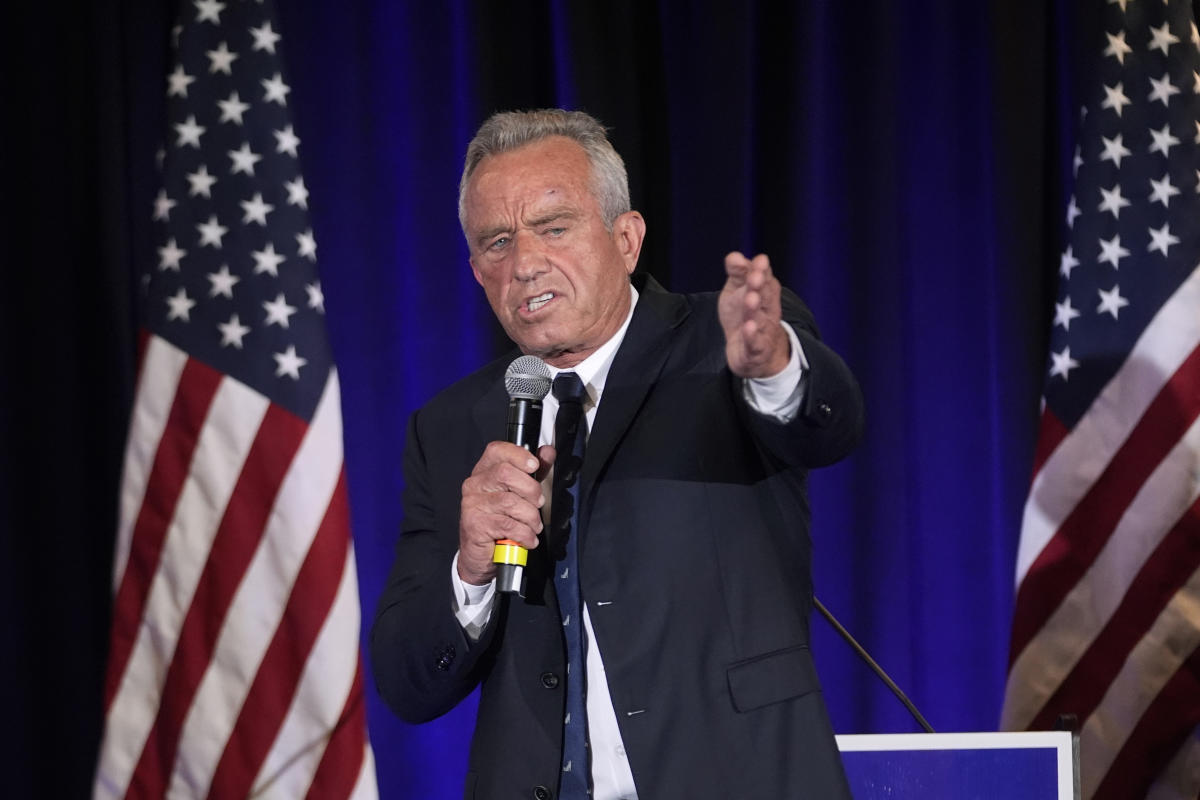PHOENIX (AP) — Robert F. Kennedy Jr. has long argued that the biggest hurdle to his presidential campaign is the perception that independent candidates cannot win. He has seen the debates as a unique opportunity to stand alongside Joe Biden and Donald Trump in front of a huge audience.
But to make it to the first stage of debate, he will need to secure a place on the ballot in at least a dozen additional states and improve his standing in the national polls within a month.
With a famous name and a loyal base, Kennedy has the potential to do better than any presidential candidate since Ross Perot in the 1990s. Both the Biden and Trump campaigns, fearing he could play spoiler, bypassed the nonpartisan debate committee and agreed to a schedule that leaves Kennedy very little time to qualify for the first debate.
Publicly, Kennedy expresses his confidence that he will make it to the podium.
“I look forward to holding Presidents Biden and Trump accountable for their performance on June 27 in Atlanta, to give Americans the debate they deserve,” he wrote on the X platform.
CNN has said that candidates will be invited if they have secured a place on the ballot in states with at least 270 votes in the Electoral College, the minimum needed to win the presidency, and received 15% in four reliable polls that have been published since March 13. The criteria are similar to those of the Commission on Presidential Debates, the nonpartisan group that has organized debates since 1988, except that the commission’s first debate would have taken place in September, giving Kennedy more time.
It appears that Kennedy has not yet met the election criteria, although he has reached 15% or higher in at least two polls that meet CNN’s standards.
The hurdle to accessing the ballots is even greater.
State officials have confirmed Kennedy’s place on the ballot in Delaware, Oklahoma and Utah, which together have just 16 electoral votes. In California, Hawaii and Michigan, smaller parties have chosen Kennedy as their candidate, essentially offering existing ballot lines, although the states have not formally confirmed Kennedy’s position. Adding them would bring Kennedy’s total to 89 electoral votes, although it is not clear whether his standing in those states would meet CNN’s criteria.
Kennedy’s campaign says he has collected enough signatures in Idaho, Iowa, Nebraska, Nevada, New Hampshire, New Jersey, North Carolina, Ohio and Texas, states with a total of 112 electoral votes. But he has not submitted the signatures, or they have not yet been confirmed by election officials.
Those states still have only 201 electoral votes.
Independent candidates like Kennedy face a labyrinth of laws that vary widely from state to state but generally require hundreds or thousands of signatures and adherence to strict deadlines.
The patchwork of laws is littered with pitfalls. And the Democratic National Committee has vowed to scrutinize Kennedy’s submissions for errors that could keep him off the ballot or at least hamper his campaign’s time and money.
Kennedy, in turn, has resorted to secrecy and creative tactics in a kind of cat-and-mouse game to get out the vote before his critics can thwart him. In California, Delaware and Michigan, Kennedy joined little-known existing parties and received their nominations. In Hawaii, he formed his own political party to nominate him, and he has followed a similar strategy in Mississippi and North Carolina.
Elsewhere, he is waiting to submit signatures until the deadline to limit the time during which critics can pore over them looking for errors. When he steps onto the debate stage next month, he will almost certainly have to change his strategy and file the petitions he is sitting on as quickly as possible.
The signatures are due in New York on May 28, which would bring Kennedy 28 votes closer if confirmed in time. He could then try to make a major push in a number of states with relatively simple requirements — many require 5,000 or fewer signatures, but they generally don’t yield many electoral votes — or target larger states, such as 19-state Illinois . electoral votes or Florida with 30.
Complicating matters further, some states are not yet accepting applications from potential independent candidates and will not do so before the first debate.
Kennedy’s vice presidential candidate, Nicole Shanahan, who is divorced from Google co-founder Sergei Brin, has pledged $8 million from her personal fortune for ballot access, the campaign announced Thursday, saying their $15 million effort ” were fully funded’.
___
Associated Press writer Amelia Thomson DeVeaux in Washington contributed to this report.






